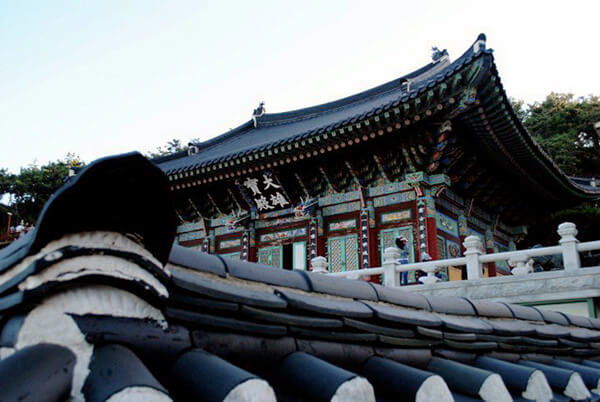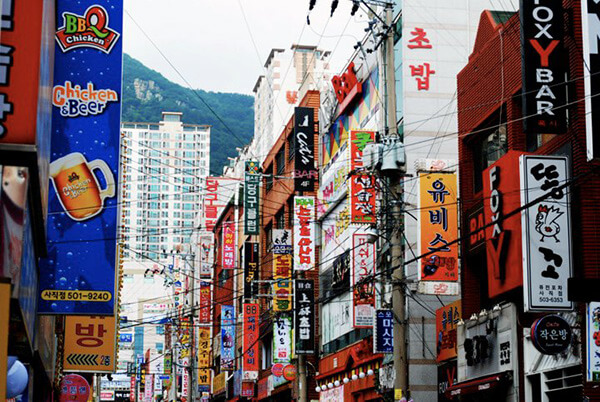Why College Graduates Should Teach English in South Korea
Article and photos by Jena Sprau

|
|
The Yonggungsa temple.
|
What Are You Going To Do After Graduation?
As a student, the ominous question may hang heavily over your head from the moment you step off the stage with your brand new diploma and probably for the months leading up to that shining moment. Often, students don’t have a sure answer. We may get to know the bedroom in our parent’s house again, return to our summer jobs, or perhaps enter the impending “real world” we have heard so much about. But for those who would like to take a break from the every day (myself included), there are numerous options to satisfy the travel itch you may be feeling. After graduating from Illinois State University, I took advantage of one of these opportunities by teaching English in South Korea. I had, in so many words, a life-changing experience. Here is how you can take advantage of this opportunity as well.
The first thing is first. It would be best to converse with friends, family, and yourself. Every school in South Korea, unless under exceptional circumstances, requires ESL (English as a second language) teachers to have a bachelor’s degree (no matter the major), a passport from an English-speaking country, and there is a working 1-year obligation. Although time goes by incredibly fast in retrospect, a year is a long time away, and you must make sure you can commit to it. If you can, the perks are outstanding. Of course, there are other countries in which you could teach English, but Korea offers some of the best benefits. You will receive a flight to South Korea and back (upon completion), accessible accommodations, half of your insurance is covered by the school, a massive bonus at the end of your contract, and most importantly, the chance to immerse yourself in an incredible culture with easy access to surrounding countries and thousands of years of history just waiting for you to uncover. Not a bad deal.
Research Where You Wish to Work and Live

|
|
Street in Busan.
|
So, if South Korea suits you, the next step is to research the best school and location. I had a friend teaching in Busan, and he had nothing but positive things to say about his experience. After speaking with him for a while and deciding I wanted to teach there, he put me in touch with the director of his school, and the process began. If you don’t have friends currently abroad, there are plenty of options to get you there! Dave’s ESL cafe is an excellent resource for finding overseas teaching positions, but others are more regional. You can search the job boards, post your resume, and connect with past and current ESL teachers. Take advantage! Otherwise, you can find a recruiter such as Footprints Recruiting with a quick web search who will find a job for you in just about any city you would like. There are plenty of large recruiters offering South Korean ESL jobs. Recruiters are generally extremely helpful, but since they are getting paid (with money from your completion bonus), they sometimes whitewash situations to get you into a school when it might not be ideal. Trust them, but do your own research and ask plenty of questions when interviewing with potential schools!
You can teach in a public school or private academy in Korea. At a public school, you have more students and more responsibility. You will have to work earlier in the day (a standard 8 a.m. - 3 p.m.), and your pay may be a bit lower. However, you will have far more vacation time and reliable contracts. Public schools may require teachers to have a degree in an education-related field or some teaching experience. Sessions start two times a year, in March and September, so plan accordingly if public schools are for you!
You also have the choice to teach in a private academy or a hagwon. If you opt for this position, you will have fewer students and a bit more freedom when planning lessons. The hours vary but are usually later in the day (I worked at an academy from 3 - 9 p.m.), and your pay might be a little higher, although that also varies. 1.8 – 2.4 million won is standard for public schools or hagwons. You will have less vacation time, and horror hagwon stories exist, as they will for every country. Make sure you do lots of research on the school you are considering. Check "blacklist" sites, talk to current and past teachers (if the school doesn’t give you a list of contacts, that’s a pretty good indication that you shouldn’t go there), and ask questions. Ask more questions than you think necessary. This is a big commitment; you should know as much as possible about the school, living situation, students, etc. You are not being a pest, I assure you!

|
|
Author teaching South Korean students.
|
Other than deciding what type of school you should teach at, you need to choose where you want to go. Seoul and Busan are great options if you enjoy big cities. Both have incredible expat communities, and most comforts from home will be available, though cheese can be expensive. Daegu and Daejeon are smaller, but both will offer the feel of a city with a little less chaos. There are also small towns, and experiences will differ depending on where you go. No matter where you live and teach, you will likely find beautiful scenery surrounding you. Before going to Korea, I had no idea the country was so mountainous. I was pleasantly surprised when I arrived and spent many weekends hiking and discovering new trails. It was incredibly relaxing, and I learned much about myself during my stay.
After finding the right job and location for you, it’s time to tackle the sometimes tricky visa process. Korean E-2 visa standards are getting more difficult, but it is for the safety of all, so it is well worth the time and effort you will put into it. It is essential to understand that your school and recruiter will help you every step of the way and be great resources should questions arise.
The required documents and background checks change often. No matter what, you will need your diploma; if your school is like mine, it will take a while to deliver it. Make sure you immediately talk to the right people and let them know you need it. They will work with you and make sure it happens. I received my diploma in late May, and everyone else got theirs sometime in August. Also, be aware that background checks can take months before they come through, so give yourself adequate time when ordering one. Several steps in the visa process are outlined above. Regardless, it’s essential to remember that you’ll have to make a trip to the Korean consulate closest to you.
Adapting to and Enjoying the Culture

|
|
Paragliding in South Korea.
|
Once you get your passport and visa back, congratulations! You are leaving for Korea soon and on your way to experiencing a remarkable 12 months. It would help to remember some things when assimilating into Korea and your new home. Keep in mind that this new culture is likely different from yours in many ways. Always remain respectful of others and aware of practices that might initially seem strange. And if you have concerns over safety and your new neighbors to the north, do not let it weigh heavy on your mind. I felt safer living in Korea than in most countries I have been to. If you are anxious, express your concerns. People who have lived in the country for a long time can speak with you about the subject; most of the time, they can soothe your worries. Although you do not have to talk to Korean or Hangul to teach English, learning common phrases like hello (annyeonghaseyo) and thank you (gamsahabnida) is beneficial. If you have the time, try to memorize the alphabet. This helps when using public transportation or eating in restaurants.
Now, prepare for fun. You will notice that some locals really like to let loose. Everyone works hard; why not play hard as well? You will likely be invited to social events, dinner parties, and weddings. While this might be intimidating at first, do not let it be. This is a great way to meet and get to know your new co-workers and friends. There are customs and traditions for food and drink, but you will catch on. I encourage you to take advantage of things that Korea does best, including noraebongs (singing rooms) or Korean BBQ restaurants (cheap and endlessly delicious), among other gems you will discover. Sample new foods and try something unexpected. This is your chance to explore!
After you have experienced new food and new customs and met new friends you will keep for a lifetime, it will be time to go back before you know it. Beware, reverse culture shock is inevitable. The difference is how you react to it. I was hard on myself upon returning to America. Since I had become so independent during my travels, it would carry on into my life at home. And though it has, the transition has been gradual. Give yourself time! You do not have to have a plan as soon as you return. Finding a job might take a short time. You have had experiences others can only dream of, and you can transform all you have learned into fundamental and very beneficial skills you can use in your personal and professional life. Employers will understand that you are independent, highly adaptable, and quick-thinking. You have seen and done a lot, so be proud of your accomplishments and translate them into success at home and abroad!
|
More on
South Korean Culture
To learn more about my adventures in Korea, including a trip to an abandoned amusement park, check out some of the highlights below. A few highlights that you might encounter daily:
— Don’t be surprised if a Korean asks you your blood type. Many believe this tells much about a person, comparable to zodiac signs in America.
— As mentioned before, there are rooms, or “bongs,” that are used for various reasons. Noraebongs, or singing rooms, always make for impromptu Karaoke parties where some of my favorite memories in Korea were made. There are also Nintendo and all-important PC bongs. Cheap entertainment? Yes, please!
— "Fan death" is legitimate in Korea. Whether or not it happens, people believe in it! Fan death is the belief that a rotating fan kept on overnight in a room with closed windows will cause the people inside to die. Due to suffocation or hypothermia, I am unsure. Apparently, this has been proven to be accurate, but skeptics remain!
— Food in Korea is some of my favorite. If you do not taste kimchi right now, you’ll probably acquire it since this pickled cabbage dish is served with every meal.
— Baseball games in Korea are an experience unlike any other. Do not be surprised if you see people tying plastic bags around their heads toward the end of the game. This is standard practice, much like the 7th inning stretch, and these bags are later used to collect garbage around the stadium.
|
Jena Sprau is a native of Rantoul, Illinois. In junior high, she first caught the travel bug while driving cross-country with her grandparents and has since visited numerous cities, countries, and continents around the globe. She currently attends Illinois State University, earning a Master's in Communication.
|
